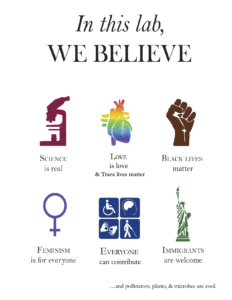
The Vannette lab is a team of entomologists, microbiologists, chemical ecologists, and community ecologists trying to understand how microbial communities affect plants and insects (sometimes other organisms too). We often study microbial communities in flowers, on insects or in soil. We rely on natural history observations, and use techniques from chemical ecology, microbial ecology and community ecology. In some cases, we study applied problems with an immediate application including pathogen control or how to support pollinators. Other questions may not have an immediate application but are nonetheless grounded in theory and will contribute to basic knowledge and conservation (e.g. how can dispersal differences among organisms affect patterns of abundance or biodiversity?).
Lab news
Summer 2025: It’s a wrap on summer internships. Mikayla Freeman completed a TERC Internship in the lab, focusing on bee foraging behavior and developing pollinator friendly planting guides for the Tahoe Basin. Miles Johnson completed a summer REU, focusing on effects of temperature on bee microbiomes. Congrats to both of you!
Summer 2025: Conference season was busy this year! Shawn and Rachel attended the Animal-Microbe Symbiosis Gordon Conference in Portland Maine; Rachel attended the Hitchcock Chemical Ecology meeting in Tahoe, and Dino organized a session at ASM Microbe on Phage in the Wild in Los Angeles.
May 2025: Rachel participates in the Arnold Arboretum Plant Biology Symposium at Harvard University. The symposium focused on plant rewards. Thanks to Elena Kramer and Yan Gong for the invitation!
March 2025: Rachel teaches ENT/ECL 225 Field Ecology at Bodega Marine Lab with Rick Karban.
March 2025: Leta’s paper describing peroxide as a variable antimicrobial defense in nectar is accepted to New Phytologist, in a special issue focusing on floral nectar. Check out the FREELY ACCESSIBLE preprint here; early view is forthcoming!
March 2025: Ryan Parisi joins the lab through the Microbiology Graduate Group, to study host-associated microbiomes. Welcome Ryan!
Winter 2025: The lab participates in outreach: Lexie contributes to Biodiversity Day and Rachel contributes to “Ski with a Scientist“, sharing what bees do in the winter
Fall 2025: Students in Rachel’s ENT 10 class produce educational videos on entomology
August 2024: Dino’s paper comparing methods to describe the phage associated with bee microbiomes is published at Microbiome, congrats Dino!
July 2024: It’s a busy summer! We just returned from our lab retreat at Point Reyes, are hosting undergraduate summer interns, and much of the lab is heading to Beneficial Microbes. Recently submitted manuscripts include “Seasonal assembly of nectar microbial communities across angiosperm plant species: assessing contributions of climate and plant traits” led by Jake Cecala and Rachel and “Targeted Viromes and Total Metagenomes Capture Distinct Components of Bee Gut Phage Communities” led by Dino Sbardellati.
May 24 2024: Paper led by Shawn Christensen describing the bacterial and fungal communities of Anthophora bomboides, a solitary bee, is now accepted to the ISME Journal and published ONLINE
May 2024: Two exit seminars scheduled! Danielle Rutkowski’s exit seminar is on Monday May 20 at 4:10 pm in Briggs 122 or via Zoom: https://ucdavis.zoom.us/j/95882849672. Shawn Christensen’s exit seminar and Merton Love seminar (for excellence in PhD research) is Friday, May 24th at 3:00-4:30PM in Walker Hall Room 1230 or via zoom.
April 2024: The lab participates in many outreach events: We hosted a table at UC Davis Picnic Day focused on native and solitary bees and the microbes they acquire from flowers. Rachel also talks about bees at the Tahoe Environmental Research Center’s lecture series.
March 2024: Lexie Martin receives a Wildlife Health Center Fellowship to support her work on Osmia bee microbiomes. Thanks to Phil and Karen Drayer for your support of this work!
March 2024: Jake Cecala’s paper describing effects of neonicotinoid pesticides on nectar microbes is accepted to Environmental Microbiology. Congrats Jake!
February 2024: Rachel visits Manaaki Whenua Landcare Research and gives a talk at the Pollination Symposium. Thanks Manpreet Dhami for the invitation and amazing visit!
December 2023: FEMS Microbiology Ecology names Danielle’s review of bee-fungal interactions as Editor’s choice!
November 2023: Danielle, Shawn, Dino, Lexie and Jake F head to EntSoc 2023! And Lexie and Shawn both won student awards for best talks in their section this year. Congrats you two!
November 2023: Paper on Anthophora bomboides microbiomes led by Shawn Christensen, now on bioRxiv:https://doi.org/10.1101/2023.11.02.565352
October 2023: Jake’s paper on comparing dispersal and host filtering of plant microbiomes now out in New Phytologist!
September 2023: Rachel and Lexie present at the Orchard Bee Association meeting on work related to Osmia lignaria and Osmia ribifloris.
Looking for old news? You’ll have to check the archives
Department of Entomology and Nematology
43 Briggs Hall (Basement)
Davis, CA 95616
rlvannette at ucdavis dot edu
Office phone: 530-752-3379
Lab phone: 530-752-4317